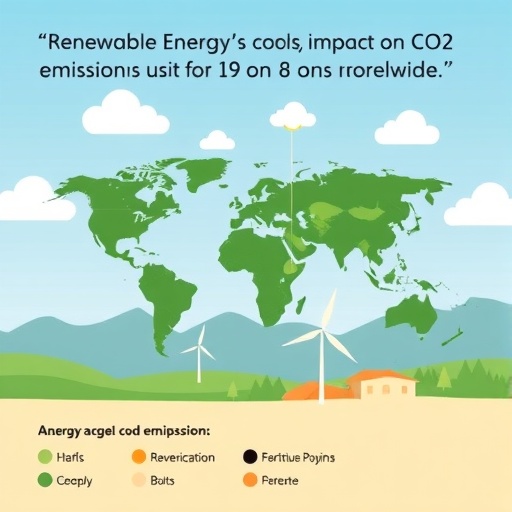The imperative to mitigate climate change has brought renewable energy sources to the forefront of global discussions. In a recent study by Kolati and Raghutla, titled “The influence of renewable energy sources on CO2 emissions: a multi-factor analysis across leading countries,” the authors delve into the complex interplay between renewable energy adoption and carbon dioxide emissions. This comprehensive research paves a crucial pathway to understanding how countries can leverage renewable technologies to curb their carbon footprints.
The study meticulously analyzes data from leading economies to understand the correlation between the deployment of renewable energy sources—such as solar, wind, and hydroelectric power—and the levels of CO2 emissions. By examining multiple factors such as economic growth, energy consumption patterns, and technological advancements, the research presents a nuanced view of how renewable energy impacts environmental outcomes. The authors employ robust statistical methods to ensure that their findings are not only valid but also applicable in real-world contexts.
One of the key findings of the research is that countries with a higher share of renewable energy in their energy mix have significantly lower CO2 emissions per capita. This correlation suggests that renewable energy could be a vital part of the solution in combating climate change. The authors argue that transitioning to renewable sources is not merely an environmental necessity, but an economic opportunity as well. Countries that invest in renewable energy technologies are not only reducing their carbon output but are also positioning themselves for long-term economic resilience.
Kolati and Raghutla further explore additional variables that affect CO2 emissions beyond just the adoption of renewable energy. They identify factors such as industrial practices, the structure of the economy, and social awareness regarding climate change as critical components. Interestingly, the study finds that in some cases, countries with deep-rooted industrial frameworks may struggle to lower emissions, even with a substantial investment in renewable energy. This complexity highlights the importance of a holistic approach to energy policy and environmental strategies.
Additionally, the study brings attention to technological advancements that enhance the efficiency and reliability of renewable technologies. For instance, innovations in energy storage, grid management, and efficiency improvements in solar panels and wind turbines are crucial for reducing emissions. These technologies not only facilitate the integration of more renewable energy into existing grids but also ensure a stable and reliable energy supply capable of meeting fluctuating demands.
A pivotal point made by the authors is the potential of governmental policies and incentives in accelerating the transition to renewable energy sources. They argue that countries which adopt supportive policies—such as tax incentives for renewable energy investments and stricter emissions regulations—tend to see faster reductions in their carbon emissions. This finding underscores the importance of political will in the fight against climate change, advocating for more governments to commit to sustainability goals.
Moreover, the research highlights the significance of global cooperation in renewable energy initiatives. The challenges of climate change are vast and require a concerted effort from countries around the world. Collaborative efforts in technology transfer, knowledge sharing, and financing renewable projects can enable developing countries to leapfrog traditional energy systems and expedite their transition towards renewable energy sources.
The implications of Kolati and Raghutla’s analysis extend beyond mere numbers; they present a fundamental shift in how policymakers, corporate leaders, and the public perceive renewable energy. The narrative is shifting from seeing renewables as just an environmental solution to recognizing them as integral to economic development and energy security. As countries grapple with energy demands amid growing populations, renewable sources will become increasingly crucial in ensuring sustainable energy systems.
In addition to their findings, Kolati and Raghutla provide a set of recommendations for country leaders. These recommendations encompass strategies for incentivizing clean energy investments, enhancing public awareness about the significance of renewable sources, and investing in research and development to spur innovation in the sector. By following these pathways, nations can foster environments where renewable energy not only thrives but also significantly reduces CO2 emissions.
Furthermore, the authors emphasize the vital role of public engagement in addressing climate change issues. They argue that citizens who are informed about the benefits of renewable energy are more likely to support and participate in policy initiatives aimed at emission reductions. This grassroots movement can create pressure on governments to take decisive action in promoting sustainable energy practices.
Finally, Kolati and Raghutla conclude their study with a compelling call to action for global leaders. They insist that tackling climate change is a responsibility that lies with every nation, and the transition to renewable energy sources is non-negotiable if we are to achieve any meaningful reductions in greenhouse gas emissions. Their research serves as a robust reminder that while the road ahead is fraught with challenges, the pursuit of renewable energy presents an optimistic pathway forward in our global fight against climate change.
In sum, this analysis offered by Kolati and Raghutla provides essential insights for both policymakers and stakeholders in the energy sector. The findings serve as a clarion call for renewed commitment to renewable energy initiatives worldwide. As nations work toward sustainable solutions, the integration of renewable energy sources will be paramount in achieving their climate goals.
Subject of Research: The impact of renewable energy sources on CO2 emissions across leading countries.
Article Title: The influence of renewable energy sources on CO2 emissions: a multi-factor analysis across leading countries.
Article References:
Kolati, Y., Raghutla, C. The influence of renewable energy sources on CO2 emissions: a multi-factor analysis across leading countries.
Environ Sci Pollut Res (2025). https://doi.org/10.1007/s11356-025-36815-4
Image Credits: AI Generated
DOI:
Keywords: Renewable energy, CO2 emissions, climate change, energy policy, global cooperation, sustainable development.




